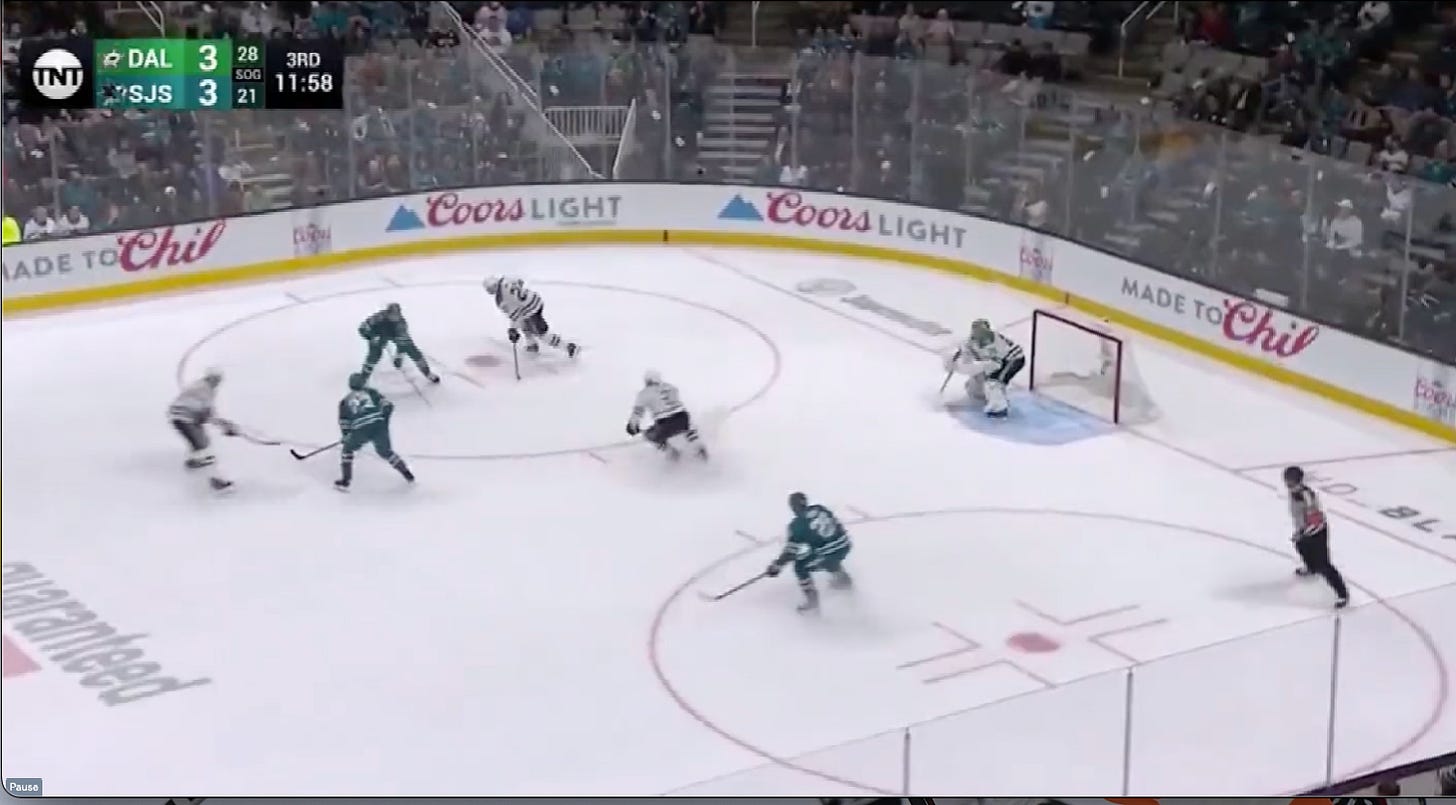5 Thoughts on Sharks-Stars
San Jose came back from down 3-0 to win 5-3.
It worked out pretty well tonight.
I had a beer league game that started at the same time as Stars-Sharks, was able to make it home in time to watch the game on delay, fast forward through commercials and intermissions and join the live broadcast for the third period.
(I won my beer league game, too, since you were curious).
Here are my thoughts on Stars-Sharks, which San Jose won 5-3, for paid subscribers only for 24 hours and then unlocked tomorrow evening.
1. From a Dallas perspective, this was a letdown.
Leading 3-0 against a bad team, coming off a big win in Vegas, the Stars let up five unanswered and lost.
But it was also another masterclass by Erik Karlsson, and it’s been enjoyable as a hockey fan to see him re-find his game after some particularly lean years in San Jose.
2. Jake Oettinger’s one-timer save on Timo Meier in the third period was good encapsulation of how much the goalie relies on his technique and skating when it comes to reading the play.
In quick succession, and on video, it looks like a bang-bang, potentially difficult save. But in reality, this wasn’t a tough stop for Oettinger.
Look at Oettinger’s positioning on the pass. He has decent depth in the crease, he’s coming across clean on the pass, and in reality he’s essentially set before Meier can even fire the shot.
3. When the Sharks tied the game on the power play at 3-3 in the second period it was effectively a 5-on-3.5.
Luke Glendening had broken his stick, and while the Sharks didn’t overly attack his side of the ice, they could have.
This prompted a wonderful question from Michael on Twitter.
So not a full piece, but here is how I’ve always viewed the broke stick on the penalty kill.
In the first and third period, the short change, a penalty killer that breaks or loses their stick should make their way to the bench for a replacement.
In the second period, when the team has the long change, I would prefer the penalty killer to keep playing without his stick as opposed to leaving the zone for a replacement.
With the short change, it can be done quickly, a player can get a replacement and back into the play. With the long change, it’s more of a detriment to effectively play a full 5-on-3 while someone goes on a stick replacement mission.
4. Jason Robertson became the fastest player in Dallas history to score 30 goals, hitting the mark in his 46th game.
Mike Modano scored 30 in 48 back in the 93-94 season.
For Robertson, so much about his game is instinctive. It’s terribly cliche, I know, but sometimes goalscoring just can’t be taught.
And that’s how he scored in the second period.
That’s not a difficult play, per se, most NHL players can pull that off in theory, but the poise and execution is what makes the difference between Robertson and your typical NHL forward.
5. It’s kind of fitting that Radek Faksa and Ty Dellandrea both scored on Wednesday.
Faksa has, deservedly so, taken a ton of grief this season for his production and cap hit of $3.25 million for each of the next three seasons.
Dellandrea has been praised as a solution, a youthful elixir that’s helped the Stars when the desperately needed something to develop from within.
They also happened to be very similar, and Faksa serves as both a cautionary tale and a model for Dellandrea’s career.
Faksa was drafted No. 13 overall in 2012, six years later Dellandrea was taken with that very same pick in 2018. Both have been viable, impactful NHL players out of that slot, but neither have been the high-point producing forward you really want to use the No. 13 pick on.
Dellandrea, however, gets the benefit of being drafted in 2018. Because of the success of the 2017 NHL Draft — the Heiskanen, Oettinger, and Robertson trio — the Stars essentially purchased a couple years of good draft will, which allowed Dellandrea to develop with less internal and external pressure.
Dellandrea played his 46th game on Wednesday, and in his 22-year-old season he has 19 points (6 goals, 13 assists). Faksa in his 22-year-old season played 45 games and had 12 points (5 goals, 7 assists).
Personally I’ve become more and more of a believer that the typical NHL player is past their prime by the time they reach 25 — yes, that makes me feel old — which is important to remember with Dellandrea. Yes, he’s good, but it’s not like he’s going to magically hit an elevator curve over the next couple seasons.
The Stars need to keep that in mind when it comes to cap management and Dellandrea in the long-term. Remember the hemming and hawing over Faksa’s deal now, and don’t make the same mistakes six years later, again.




Spot on about Dellandrea. He's a nice player and a nice piece on the team, and he is what he is. He was never projected to have a high offensive upside and honestly should be compensated as a replacement player. How good a guy he is shouldn't come into it.
Excellent article, I didn’t realize we are tied to Faksa for 3 more years. Dellandrea is excellent as a middle six forward with very high energy.